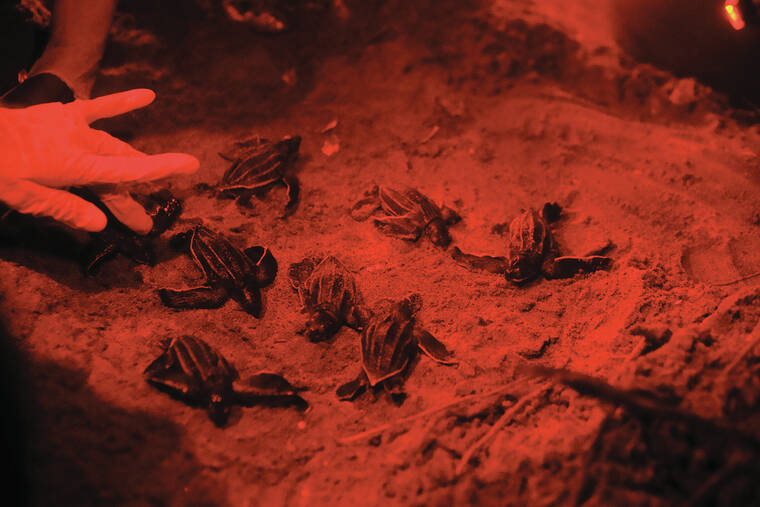ARMILA, Panama — On a Panamanian beach long after dark, a group of undergraduate students dug into the sand to excavate a sea turtle nest, their lamps casting a soft red glow as they studied eggs, inventoried the success of the hatch and checked for any surviving hatchlings stuck at the bottom of the nest. Nearby, armed members of the National Border Service stood watch for protection in an area known for drug trafficking.
The students worked under the guidance of Callie Veelenturf, who founded a group that works to protect leatherback turtles and pushed for a new law in Panama that guarantees sea turtles the legal right to live and have free passage in a healthy environment.
The new law “will allow any Panamanian citizen to be the voice of sea turtles and defend them legally,” Veelenturf said in a text message as she boarded a plane to Panama City after her group’s work near Armila. “We will be able to hold governments, corporations, and public citizens legally accountable for violations of the rights of sea turtles.”
When Panama’s president signed the law in March, it was a victory for people who have long argued that wild animals should have so-called rights of nature that recognize their legal right to exist and to flourish, and allow for lawsuits if those rights are violated. Experts hope it’s part of an evolution that will see other countries take similar steps to protect species under threat..
“Business as usual laws aren’t doing enough to protect against the extinction crisis and climate change,” said Erica Lyman, a clinical law professor and director of the Global Law Alliance for Animals and the Environment at Lewis &Clark Law School in Portland, Oregon. “This is an attempt at a new kind of framing that offers hope.”
Wildlife protection laws typically are passed because of some perceived benefit to humans, Lyman said. Panama’s law instead considers what sea turtles need and the fact that humans should curb their behavior to meet those needs, she said.
The law gives sea turtles the right to an environment free of pollution and other human impacts that cause physical or health damage, like climate change, incidental capture, coastal development and unregulated tourism.
What makes the law remarkable is that it explicitly says sea turtles, as living creatures, have rights, and with enough specificity that those rights can be enforced, added Nicholas Fromherz, an adjunct law professor and director of the alliance’s Latin American Program.
Panama’s new law came after Ecuador’s highest court in 2022 ruled in a case about a monkey kept in a private home that wild animals are rights-holders under the constitutional provisions for rights of nature. That was an important step in evolving the definition of nature from a site-specific or place-based concept, to include individual wild animals, Lyman said.
Both Lyman and Fromherz saw Panama’s law and recent judicial rulings as evidence of a trend toward safeguarding the legal rights of animals. Besides the Ecuador case, a Pakistan court in 2020 held that animals have natural rights that should be recognized.
That decision sharply criticized humanity’s treatment of wild animals and drew on religious doctrine.



